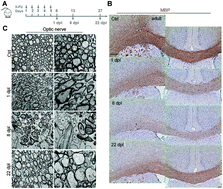TCF7L2 activation is required for myelin regeneration in 5-FU-induced demyelinating mice†
Abstract
Previous studies have shown that 5-FU (5-fluorouracil) could cause delayed myelin degeneration by inducing oligodendrocyte death. However, it is not clear whether 5-FU-induced demyelination is recoverable. Here, we demonstrated that 5-FU-induced demyelination could occur in the corpus callosum of different ages of mice. Inconsistent with a delayed demyelination in the white matter of adult mice, 5-FU could result in acute damage to oligodendrocytes in the white matter of adolescent mice. The spontaneous myelin repair could emerge after 5-FU withdrawal both in the adolescent and adult mice. However, the recovery period of myelin-injured adolescent mice was faster than that in adults. Our data identified that the transcription factor TCF7L2 was markedly re-activated and re-appeared in the cerebral white matter of injured mice. In addition, TCF7L2 was sufficient for oligodendrocyte proliferation and differentiation in vitro. Altogether, our data uncovered that 5-FU-induced demyelination was recoverable and TCF7L2 might be a potentially therapeutic target in 5-FU-induced myelin damage.


 Please wait while we load your content...
Please wait while we load your content...